- Home
- Raymond Benson
The Rock 'n Roll Detective's Greatest Hits - A Spike Berenger Anthology Page 12
The Rock 'n Roll Detective's Greatest Hits - A Spike Berenger Anthology Read online
Page 12
“I don’t believe that. You’re, what, thirty-five?”
“Thirty-eight.”
“You could still get pregnant.”
“Why, are you volunteering or something?” She jabbed him in the side.
He shrugged. “I seem to remember us fitting together pretty good.”
“Yeah, but that was over ten years ago.”
“So? We haven’t changed that much.”
“What is this, Spike, are you flirting with me? I thought this was a business date.”
“It is. I’m just saying you could still go for motherhood if you really wanted it. Women a lot older than you have had healthy kids.”
“Okay, okay, now let’s change the subject.”
They spoke about numerous topics, including other employees at Rockin’ Security, the absurdity of the country’s foreign policy, the merits of the newest CDs they had purchased recently, and what current films were worth seeing. By the time they reached Franklin Village in Hempstead, they were on to whether or not Madonna would be as lasting a sex symbol as Marilyn Monroe.
Berenger led Suzanne inside the building, signed in, and followed the corridors to the Neighborhood, where his mother now resided. Betty Samuels caught up with them, saying, “Mister Berenger, I’m glad you made it before I left for the day.”
“Hello Mrs. Samuels. You remember my colleague Suzanne Prescott?”
The two women shook hands.
“How’s my mom?” he asked.
“She’s fine but I must warn you she’s a little agitated about the move. We brought her to the new room this afternoon after a leisurely walk through the mall. She enjoyed shopping, even though she didn’t buy anything nor showed any desire to do so, and we had a nice snack at one of the bakeries there. She kept talking about you, I’m happy to say, although she believes you’re still in college.”
Berenger chuckled. “I wish.”
“She also mentioned a dog named Birdie. At least I think it was a dog.”
“Right. Birdie was her Irish Setter she owned, gosh, when I was a kid.”
“Well, she kept asking about Birdie, wondering if she was all right.”
“Oh dear. Birdie’s been dead for thirty years.”
“I figured as much. At any rate, your mother did notice she was in a new room, even though it looks exactly the same as her old one.”
“Well, she’s pretty bright. I can’t believe the disease has progressed so rapidly that she wouldn’t realize she’d been moved.”
“Yes, that’s probably true. Anyway, it’s a lovely room. The only difference is she won’t have the run of the building now. She’ll get used to it.”
“I’m sure she will.”
Mrs. Samuels showed him how to punch in the special code on the keypad to get into the Neighborhood—a precaution to keep the residents inside. They found Ann Berkowitz in the television room, where she and three other residents were watching Chicago on video.
“Hi, mom,” Berenger said. “How are you this evening?”
She looked up and said, “Spike! You finally came!”
“Sure, I told you I’d come this evening.”
“You have to get me out of here. Something’s different. Nothing’s the same.”
“They moved you into a new room, mom. Don’t you like it?”
“No. None of my things are in there.”
“What do you mean? All your stuff is in there. They moved everything you have into the new room. Hey, you remember Suzanne? She came to see you too.”
“Hi, Mrs. Berkowitz,” Suzanne said. She leaned down and gave the woman a kiss on the cheek.
“Of course I remember my daughter-in-law,” the woman said. “How are you, dear? How are the children?”
“Mom, Suzanne’s not your daughter-in-law. Suzanne’s a colleague of mine. She works where I work.”
“Oh? Does that mean you’ll be getting married soon?”
“No, mom. Suzanne’s a friend.”
“Dear me, what am I thinking? I’m being silly. You’re already married,” Mrs. Berkowitz said.
“Nope, mom, wrong again. I used to be married but that was a long time ago. Linda was my wife but we got a divorce.”
Mrs. Berkowitz shook her head. “I don’t know what’s wrong with me. I can’t remember things like I used to.” She looked at Suzanne and proclaimed, “I graduated in the top ten of my class!”
“That’s very impressive, Mrs. Berkowitz,” Suzanne said and smiled at Berenger.
“So are you going to get married again?” Mrs. Berkowitz asked her son. “It would be nice to have some grandkids.”
“You do have grandkids, mom. Michael and Pam. Remember? They’ll be coming to see you soon, I’m sure. And don’t forget Judy, Bill, and Davey—Carl’s kids. They live in California. They’re your grandkids too.”
“Oh, yes, Carl. I haven’t seen Carl in the longest time. I’m going to have to tell Abe to take me to see Carl.”
Berenger and Suzanne exchanged looks. Uh oh.
“Where is Abe?” Mrs. Berkowitz asked. “Isn’t he supposed to pick me up soon?”
“Mom, Abe died, remember?”
“But I just talked to him on the phone. He’s supposed to pick me up. We’re going to the theatre.”
Berenger decided to try something. “Mom, do you remember my dad? Daniel?”
Mrs. Berkowitz scrunched her face. “Daniel. The name sounds familiar. You say he was your father?”
“Yeah. You were married to him before you were married to Abe.”
“I was?”
“Uh huh. That’s how come you’re my mom!”
She laughed at that. “Oh, you’d still be my son no matter who your father is. How is Daniel?”
Sheesh, Berenger thought. “Well, Daniel died, too.”
“My, my, we’re dropping like flies. At least I still have Abe.”
It was hopeless. They tried to steer her onto other topics and eventually got her to show them the new room. Mrs. Samuels was right—it looked exactly like the old one. Berenger made sure his mom had plenty of toilet paper in the bathroom and checked to see that her laundry had been done. Then they sat in the room for a half-hour and looked at old photo albums. Mrs. Berkowitz kept going back to pictures of her Irish Setter.
“Birdie was a good dog,” she said. “I hope she’s happy.”
“I’m sure she is, mom.”
After a while, Mrs. Berkowitz showed signs of being tired. One of the staff nurses came in to help her get ready for bed, so Berenger and Suzanne said good night.
“I’ll be back to see you soon, mom,” he said. He gave her a hug and a kiss and quickly walked out of the Neighborhood. Suzanne quickly said goodbye and had to rush to catch up with him.
Outside, Berenger wiped a tear from his face.
“Spike, are you all right?” Suzanne asked.
“Yeah. Sorry. It’s just hard to believe she could have deteriorated so quickly.”
“I know. It’s a horrible disease.”
Suzanne gave him a hug and he squeezed her like a bear. When he finally released her, Berenger said, “Come on. It’s time to rock ‘n’ roll.”
They walked to the Altima and drove back to the city in silence.
14
Angry Eyes
(performed by Loggins and Messina)
Mortimer’s was a relatively new club in West Greenwich Village, a rock ‘n’ roll venue established to compete with the older, more well-known jazz clubs like the Blue Note and Village Vanguard. The acts ran the gamut from unknowns and local groups to big name talent. Mortimer’s opening night featured none other than Eric Clapton. The place had rapidly become a hot spot and tickets were difficult to come by even when no one famous was playing there.
But Berenger had connections. The owner, Matthew Eisenberg, was a temperamental but savvy promoter who poured his life savings into creating the club and it paid off. When Berenger managed bands in the eighties, he had worked with Eisenberg on several occas
ions to book his groups in the New York area. Eisenberg nearly lost his shirt when he tried to put on a festival a la Woodstock and Berenger had helped bail him out with a loan and providing some acts at the last minute when a headliner cancelled. Eisenberg was forever in Berenger’s debt.
“Spike! Suzanne!” the entrepreneur shouted when he saw them. Eisenberg was bald, thin, and wore glasses with dark, thick frames. Despite the nerdy appearance, Berenger knew the man to be sharp and unscrupulous in his business dealings. He was well respected in the industry.
Eisenberg gave Berenger and hug and a slap on the back and then pecked Suzanne on the cheek. “You should have let me know you were coming! The place is packed.”
“Can you get us a couple of seats at a table, Matt?” Berenger asked.
“I’ll see what I can do. Follow me.”
He led them through the crowded lobby, quickly got their hands stamped, and found a small round table near the back. “It’s not close but it’ll have to do. Is it all right?” he asked.
“It’s great, Matt, thanks.”
“No problem. First drink’s on the house. What can I tell the waitress to bring you?”
“I’ll have a White Russian,” Berenger said. He looked at Suzanne.
“Just a glass of red wine,” she answered.
“Oh, and Matt, if you can get word to Dave Bristol that I’m here and I’d like to speak with him and the band after the show, I’d appreciate it.”
“Sure thing. Good to see you, Spike.” Eisenberg rushed off, found one of the waitresses and gave her the order.
“Is there anyone in this business you don’t know?” Suzanne asked.
Berenger scratched his head and said, “Hmm. I’ve never met Britney Spears, damn it.”
She laughed. “She’s too young for you.”
“She sure doesn’t act like it.”
The drinks came quickly and Berenger felt his spirits lifting after the rather melancholy drive back to the city from Long Island. His mother’s condition normally didn’t affect him so strongly but for some reason that night it was particularly painful. Perhaps it was the fact that she couldn’t remember his father. Never mind, he told himself. Enjoy the evening.
A local band by the name of Chicago Green opened the show. A five-man jam band outfit, the members appeared to be just out of high school. Berenger was impressed with their musicianship, though. He thought that they were already good enough to attract some attention. Suzanne found the bass player particularly cute.
After a twenty minute break, Blister Pack took the stage. Eisenberg introduced the band, announcing it as their debut performance. Dave Bristol, one of the tallest rock stars Berenger had ever known, waved at the crowd and received a standing ovation with catcalls and whistles. Brick Bentley and Moe Jenkins blew kisses and assumed their positions on stage. Without Flame, the trio focused on Jenkins’ heavy array of keyboards, Bentley’s bass, and Bristol’s powerful drumming and vocals. The result was a power-pop jazz-rock fusion extravaganza very similar to Flame’s Heat but without Flame’s distinctive vocals and guitar. Berenger noted that the material was mostly instrumental, which was a good thing because Bristol’s voice wasn’t made to carry a band.
Half of the ninety-minute set consisted of new stuff that Berenger had never heard. He thought it was damned good, and the way Suzanne was rocking in her seat she apparently enjoyed it as well. The rest of the set was filled out with a couple of early Hay Fever hits and a good deal of Flame’s Heat material. Berenger felt the Flame’s Heat songs didn’t work as well without Flame’s guitar and voice. However, the audience was very enthusiastic. It was as if they were witnessing the remaining two Beatles, reunited for a spin-off project. Half of the magic was missing, but what was there was certainly alchemy of sorts.
The encore was Hay Fever’s title track from the album Sneeze! and it brought down the house. No one remained sitting as a swarm of people packed the space in front of the stage. Suzanne stood on her chair and Berenger wrapped his arms around her bare legs to support her. Her skin felt smooth and enticing; he had to force himself to concentrate on the music. For a moment he missed the intimacy he had once enjoyed with her. It would most likely never happen again but it was a nice fantasy.
When the house lights came on, Berenger helped Suzanne down from the chair. She was giddy with excitement. “They were great, weren’t they?” she gushed. “What did you think?”
“They’re tight,” Berenger said. “I would have liked it better if they’d stuck to new material. The old stuff doesn’t work as well.”
“Oh, don’t be a snob. Think of it like new arrangements, or covers, or something. We going backstage?”
“Yeah.”
Eisenberg worked his way through the crowd funneling out of the club and approached them. “Did you like it?” he asked.
“Sure did!” Suzanne said.
“Thanks for helping us out, Matt,” Berenger said.
“No problem. Come on, Dave’s expecting you backstage.”
“They coming out to greet their fans?”
“Nah, Dave was never much for that sort of thing. He always left that to Flame, if you’ll recall.”
“Oh, right.”
Eisenberg led them through the door guarded by a burly bouncer and into the space that served as the wings, which consisted of a couple of dressing rooms and a storage area. Eisenberg knocked on one of the dressing room doors. A shirtless Dave Bristol opened it. He had just emerged from the shower and was dressed only in sweatpants. A good-looking, wiry man in his fifties, Bristol grinned widely when he saw Berenger.
“Hey, how ya doin’, Spike?” The two men embraced each other.
“I’m good, Dave. You guys played great.”
“Thanks, man.” He looked at Suzanne and snapped his fingers. “Suzie, right?”
“Suzanne.”
“I knew that. How are you, beautiful?”
“Fine. I really enjoyed the show.”
“Good. Come in, come in.” He held the door open for them and put on a T-shirt. “Grab a seat and I’ll get the other guys.” Apparently Bristol rated his own dressing room while Jenkins and Bentley had to share one. Bristol knocked on the other door and told his bandmates to join them.
Eisenberg left the quintet alone with a six-pack of cold Bud. Berenger had met Bentley and Jenkins on a few occasions but wasn’t as close to them as he was to Bristol.
“I won’t take up too much of your time,” Berenger began. “I just have a few questions and want to get some impressions from you guys. As you know, I’m working for Adrian Duncan and his mom. I’m not here to say I think he’s innocent or I’m doing my best to get him off. I’m here to gather information and facts to present to his lawyer. It’s up to the lawyer to decide what to do and how to present a defense. So please, I’d appreciate your honesty and candor, okay?”
The three men nodded. Bristol took a long drink of beer and then said, “Just don’t ask us if we’re sorry that Flame got off’d.”
“All right, are you sorry that Flame got off’d?” Berenger asked.
“I said don’t ask us that.”
“I’d like to know how you feel about it.”
Bristol looked at Jenkins and Bentley. They shrugged as if to say, “Go ahead.” Bristol faced Berenger and said, “We hate the guy, Spike. He was asking for it. I’m sorry to say that but it’s the honest truth. Don’t get me wrong. I loved Flame like a brother, we knew each other a long time, and we went through hell and high water together. But he did some things that will leave permanent scars.”
“Besides breaking up Flame’s Heat and becoming a fundamentalist cult member?”
Bristol nearly choked on a swallow and said, “Isn’t that enough? We’re talking about a very lucrative gig that Flame just walked away from. He threw us away like we were expendable pieces from some kind of game he was playing. We were discarded, man. Flame’s Heat was huge and Flame turned his back on us to do religious cult music! Is that insane,
or what?”
Berenger shrugged. “I don’t know. If he found religion you can’t really fault him for that. You have to respect what an artist wants to do with his life.”
“Yeah?” Bristol said. “Tell that to Cat Stevens’ fans.”
Jenkins and Bentley laughed. Berenger smiled and said, “You have a point, I admit. So, tell me. You guys were close to him when he converted. What happened? How do you explain it?”
Jenkins said, “He went crazy, man.”
“Yeah, he went plain nuts,” Bentley concurred.
“I’ll tell you what happened,” Bristol continued. “It was that girlfriend of his. Brenda Twat, or whatever her name is.”
“Brenda Twist.”
“Yeah, I know. She seduced him to the Dark Side, man.”
“How did they meet?”
“They met in rehab. Remember Flame went into rehab in 1998?”
“Uh huh.”
“Flame’s Heat was really big at the time and for some reason Flame was doing every drug he could get his hands on.” Bristol looked at the other two guys. “We weren’t saints ourselves, but we weren’t into the excess that Flame was into. It was like the guy wanted to kill himself. I was afraid he’d OD one night and we’d find him on his dressing room floor with a syringe in his arm.”
“It was heroin?”
“Yeah, heroin, coke, you name it. He was into the speedball thing, mixing the two of ‘em. He drank an awful lot, too. He was pretty bad off. Let’s see, he was in and out of rehab two or three times in the early nineties. You guys remember?”
Jenkins answered, “I think it was twice, but he didn’t stay long.”
“Yeah, twice. Anyway, I was one of the folks who talked him into going in 1998. Me and his wife Carol. Ex-wife, that is. And Al Patton. Actually—hey!” He turned to his colleagues. “Did you guys see Al tonight?”
“No,” they answered in unison.
“That bastard! He didn’t show for our debut performance! What a prick!” Bristol threw the bottle of Bud against the wall, breaking it. It was an example of his famous temper. Berenger waited for him to cool down a second and then the man resumed talking as if nothing had happened. “Anyway, just about everyone Flame knew pleaded with him to get some help. Finally, there was one night he had to go to the emergency room. It was after one of our gigs in England—Liverpool. He really did OD and had to be rushed to the hospital. We were lucky to keep it out of the newspapers. I think Al Patton paid off some people to keep it quiet. It was touch and go but Flame got through it. We had to cancel some shows. Oh, and the police there charged him with possession of narcotics, too. It was a mess. I don’t think they were gonna let Flame’s Heat return to the UK. Not that it mattered, because we didn’t play in public again after that. Flame went into rehab for good and came out a changed man.”

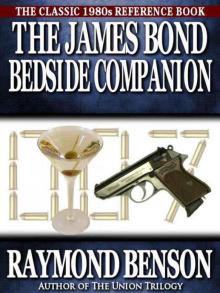 The James Bond Bedside Companion
The James Bond Bedside Companion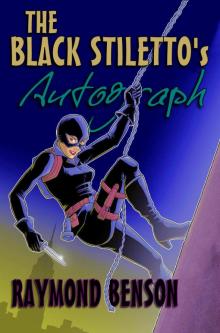 The Black Stiletto's Autograph
The Black Stiletto's Autograph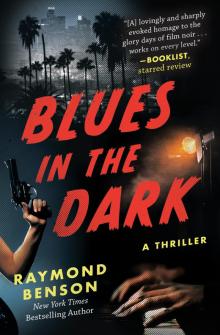 Blues in the Dark
Blues in the Dark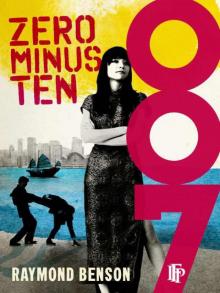 Zero Minus Ten
Zero Minus Ten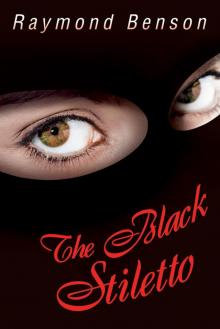 The Black Stiletto
The Black Stiletto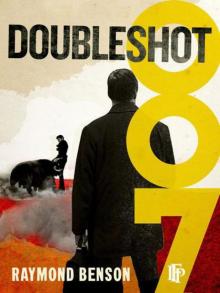 Doubleshot
Doubleshot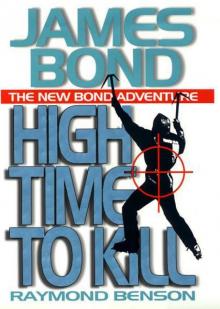 High Time To Kill rbb-3
High Time To Kill rbb-3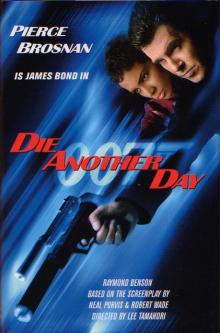 Bond Movies 07 - Die Another Day
Bond Movies 07 - Die Another Day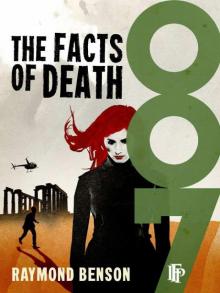 The Facts Of Death
The Facts Of Death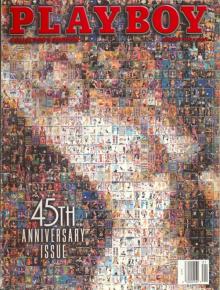 Midsummer Night's Doom
Midsummer Night's Doom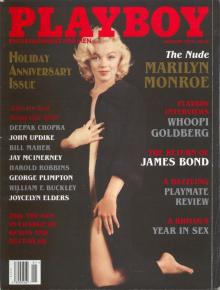 Blast from the Past
Blast from the Past The Secrets on Chicory Lane
The Secrets on Chicory Lane High Time To Kill
High Time To Kill The Black Stiletto: Black & White
The Black Stiletto: Black & White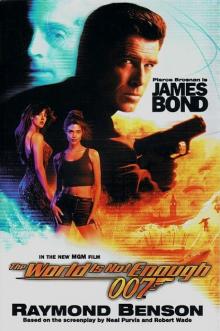 The World Is Not Enough jb-1
The World Is Not Enough jb-1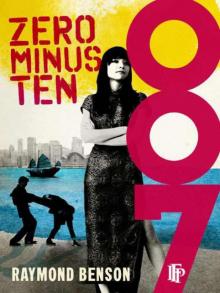 Zero Minus Ten rbb-1
Zero Minus Ten rbb-1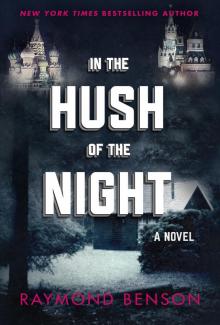 In the Hush of the Night
In the Hush of the Night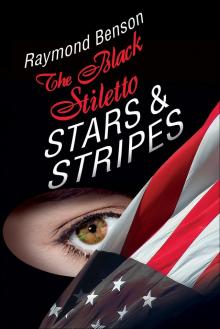 The Black Stiletto: Stars & Stripes
The Black Stiletto: Stars & Stripes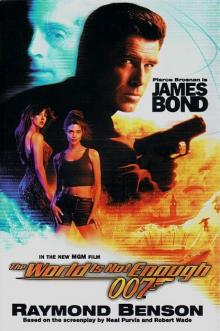 Bond Movies 06 - The World Is Not Enough
Bond Movies 06 - The World Is Not Enough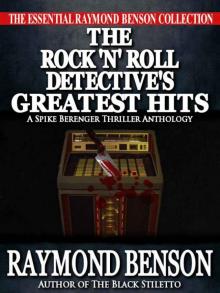 The Rock 'n Roll Detective's Greatest Hits - A Spike Berenger Anthology
The Rock 'n Roll Detective's Greatest Hits - A Spike Berenger Anthology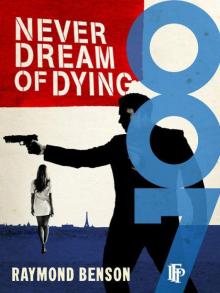 Never Dream Of Dying
Never Dream Of Dying